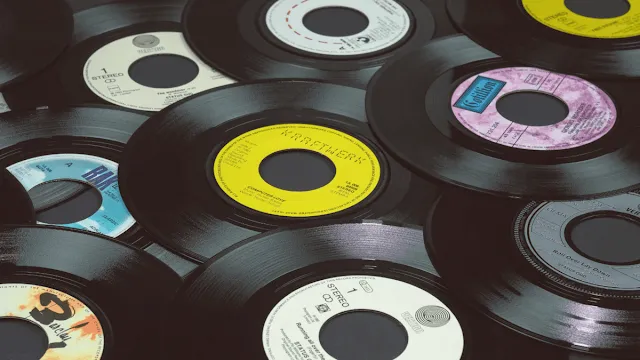As an artist, you want as many fans as possible to listen to your music, so what is the best way to do this? What exactly is the difference between an LP vs EP and an EP vs album?
If you're asking this, you’re probably wondering: in music, what does EP stand for? You may be an emerging artist looking to build on your existing fanbase, ensuring they stay engaged. So, what are the benefits of releasing an LP vs EP vs album, and how many songs does an EP usually contain?
With the music industry shifting to a more digital landscape, listeners have shorter attention spans and can access more music in less time than ever before. So, what’s the best approach for releasing music to keep your listeners coming back for more?
LP vs EP: What’s the Difference Between an Album and an EP?
First, a single is a bit misleading—it doesn’t necessarily mean just one track. For example, a single in vinyl production typically had an A-side and a B-side. In today's digital world, a single can often mean one song but can also include up to three tracks, as long as they fall within certain length constraints.
An EP, short for extended play, contains more tracks than a single but fewer than an album. On the other hand, an LP stands for long play, which essentially refers to an album. The primary difference between an EP vs LP is the number of songs and the total length of the project.
Here's a guide to help you:
Singles
- 1-3 tracks
- Each track is less than 10 minutes long, and the total running time is under 30 minutes.
EP
- An EP can either be:
- 1-3 songs with one song lasting at least 10 minutes and a total running time of 30 minutes or less.
- Or 4-6 songs with a total running time of 30 minutes or less.
Album/LP
- 7 or more tracks
- More than 30 minutes in length
- Considered one cohesive product
Is It Better to Release Singles or Albums?
Several artists have shown that releasing singles before an album can be a strategic move. For example, Taylor Swift’s 10-minute single “All Too Well” drew massive attention, proving that well-crafted singles can have a powerful impact. Other artists like Camila Cabello, Cardi B, and Jason Derulo also released singles ahead of their albums, keeping fans engaged while building anticipation for the full release.
Adele demonstrated this strategy when she dropped her single “Easy On Me” before releasing her studio album 30. The single generated a lot of excitement, making the album's release even more successful.
Why Choose an EP Over an Album?
Releasing an EP can be a strategic move for emerging artists. It is more affordable and quicker to produce than a full album, which is essential for those with limited resources. Releasing an EP allows you to showcase your music without the full commitment of an album and gain valuable feedback.
If you're an emerging artist, EPs are also a great way to keep your fanbase engaged with frequent releases. Additionally, EPs attract new listeners by providing a quick, easy listening experience that can lead them to explore your other works.
For established artists, releasing a full album allows for deeper exploration of musical themes and creativity, which can resonate with larger, more dedicated fanbases. Albums tend to receive more critical attention and can have a greater potential for awards and recognition.
Best Release Strategies for EPs and Albums
For EPs: Since EPs are shorter, it's essential to release them more frequently to keep your audience engaged. Releasing singles from the EP, paired with music videos or live performances, can help generate buzz and anticipation.
For Albums: The strategy for releasing an album involves more planning and promotion. Lead singles released months ahead of the album's drop can build anticipation, and events like album launch parties or tours can further promote the release.
Benefits of Releasing an EP in the Digital Era
With digital streaming platforms like Spotify, listeners can access music more quickly than ever before. Weekly playlists, created using algorithms, help users discover new artists, meaning your EP could reach new listeners. Platforms like Instagram and TikTok also play a significant role in music promotion.
Additionally, examples like the Unofficial Bridgerton Musical—which originated on TikTok and won a Grammy for Best Musical Theater Album—prove that EPs and albums can succeed, even for independent artists.
How to Release EPs Effectively
The "Waterfall Strategy" is a smart way to release music. By consistently dropping singles over time, you can gauge which tracks perform best among your fans and then release them as part of an EP. This method maintains fan engagement and grows your audience as you build towards a full album release.
Album Release Checklist
If you’re planning to release an album, make sure you have a well-thought-out plan. Here’s a checklist to help guide your release:
- Secure a domain name for your website.
- Trademark your artist/band name.
- Set up social media profiles.
- Register with a Performing Rights Organization (PRO) and SoundExchange.
- Work with a digital distributor to help with royalties and pre-release strategies.
- Launch a website and set up Google Analytics to track traffic.
- Create a mailing list.
- Write your artist bio.
- Plan your promotional strategy.
Final Thoughts on LP vs EP
Deciding whether to release an EP or album depends on your budget, audience, and overall goals. While EPs offer a low-cost, high-frequency approach, albums allow for a deeper connection with fans and a broader exploration of your musicality. In the end, you should do what feels right for you and your career, but releasing an EP first can be a great way to build momentum for a larger album release later on.



